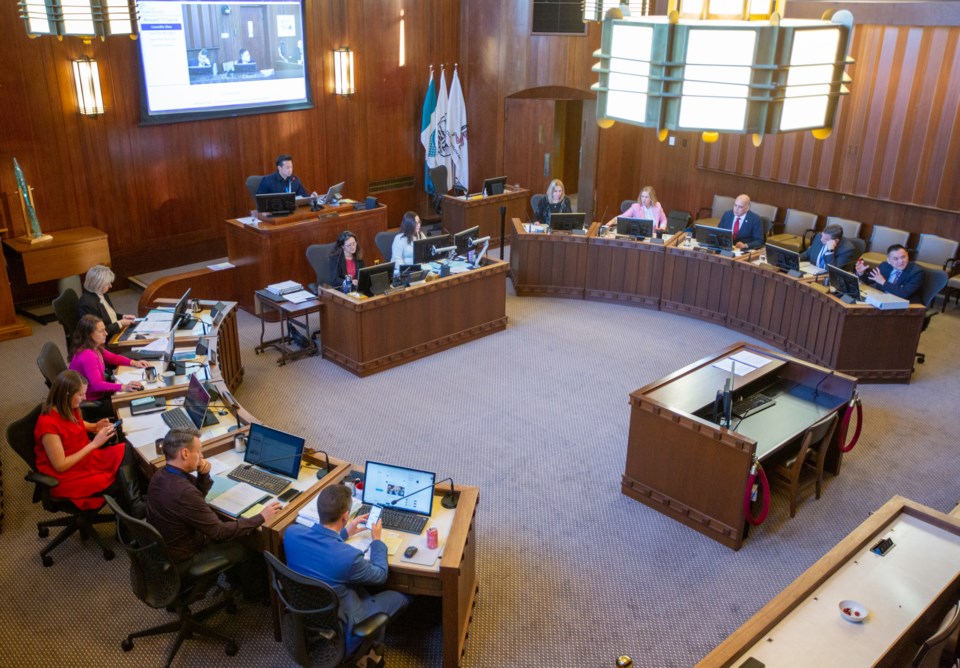A group of small business leaders argued unsuccessfully Wednesday at Vancouver city hall to have council reduce a portion of the property tax load that businesses will pay this year and shift it to homeowners’ bills.
Council was unanimous in rejecting the leaders’ pleas and based it on an of the city’s tax policy by Ernst & Young, which concluded there was “no compelling evidence” to shift a bigger portion of tax to residential property owners.
The leaders were asking for a two per cent shift over four years. Residential property owners currently pay 57.1 per cent of the tax share, and non-residential 42.9 per cent.
“This decision made today is not made lightly by any stretch,” said Coun. Rebecca Bligh, who noted she supported a tax shift in 2019.
“We know now that we are dealing with a very different context, not only for residents, but also for businesses in this post-COVID era and the challenges related to that in terms of affordability.”
Representatives of four business improvement association societies, a property tax expert and a senior policy analyst from the Canadian Federation of Independent Business (CFIB) requested council give businesses a tax break.
'Dropping like flies'
Emily Boston of the CFIB said recent data from the organization showed that four in 10 Vancouver small businesses have seen their property tax bill increase by at least 11 per cent in the last year.
And more than three in 10 businesses have seen their bill increase by more than 20 per cent, she said.
“Just yesterday, a small business owner wrote into CFIB saying we simply cannot get ahead with rising rents, property taxes and poor economic conditions,” Boston told council, before quoting from the letter, which read:
“Vancouver businesses are dropping like flies. This is our 20th year in business, which should be something to celebrate, but instead we are worried scared and concerned for the future ahead.”
Boston cited further CFIB data that showed shifting Vancouver's property tax revenue distribution by two per cent over four years — so half a percent yearly — would return “substantial savings” to businesses.
“The average commercial property in Vancouver would save more than $4,600 over four years,” she said. “But in stark contrast, it would only cost the average residential property an extra $334.”
'You ought to be alarmed by this'
Paul Sullivan of Ryan LLC, who leads the Business Tax Alliance, a partnership with B.C. business improvement associations, supplied a handout to council that compared property tax rates in municipalities.
“If you draw a line through most of those municipalities, you're sitting at about $300 per capita, and Vancouver's sitting there at $500 per capita,” Sullivan said. “And under your watch, that gap is rapidly changing. You ought to be alarmed by this.”
Sullivan pointed out the tax base has grown with the increase in new homes.
“In the past 10 years, we have grown 600 new commercial properties and 25,000 new residential properties — that's a growth rate of 42 to one,” he said.
“In the past five years, it's gotten substantially worse. We've had a total of 68 new properties in commercial and 12,000 residential. That's 184 to one.”
'Tax burden unsustainable'
Jane Talbot, the CEO of the Downtown Vancouver Business Improvement Association, provided more statistics in making her argument for a two per cent tax shift over the next four years.
“In the last 10 years, taxes per residential property increased by $1,369, while taxes per commercial property went up by $11,608 — that is a 750 per cent difference,” Talbot said.
“We hear directly from our business community that this tax burden is unsustainable. Moreover, it is untenable, given the additional costs of cleaning, security, public safety, streetscape maintenance and development costs being shouldered by BIAs and the business community.”
A that summarized Ernst & Young’s review of Vancouver’s tax policy said there was “no compelling evidence” that warrants a tax shift between non-residential and residential property classes at this time.
“Recent economic development has presented financial challenges to households and businesses, and both have limited capacity to absorb further property tax increases arising from a tax shift,” the report said.
'Don't think that they're forgotten'
In his closing remarks, Mayor Ken Sim thanked the leaders for speaking to council and “not being afraid to have these conversations in this chamber.”
“If our small businesses don't succeed, we don't succeed,” the mayor said. “I think we're all on the same page on that one. And what we want to do, is we want to create a place where our businesses can succeed.”
Sim argued that success includes investments in public safety, neighbourhood cleanliness and cutting “regulatory red tape” at city hall. He cited investments in Chinatown and Gastown that have made a positive difference in those neighbourhoods.
“We have safer streets and cleaner streets, and we have a revitalized Chinatown,” said the mayor, adding that his goal is not based solely on tax breaks but creating a thriving business community.
“So there's actually an environment where people feel safe, and it generates revenue because more people are coming and this place is more vibrant. I just wanted to be clear — that's what we're working on, so our businesses don't think that they're forgotten. Very far from it.”
Meanwhile, the final property tax increase this year is now .





